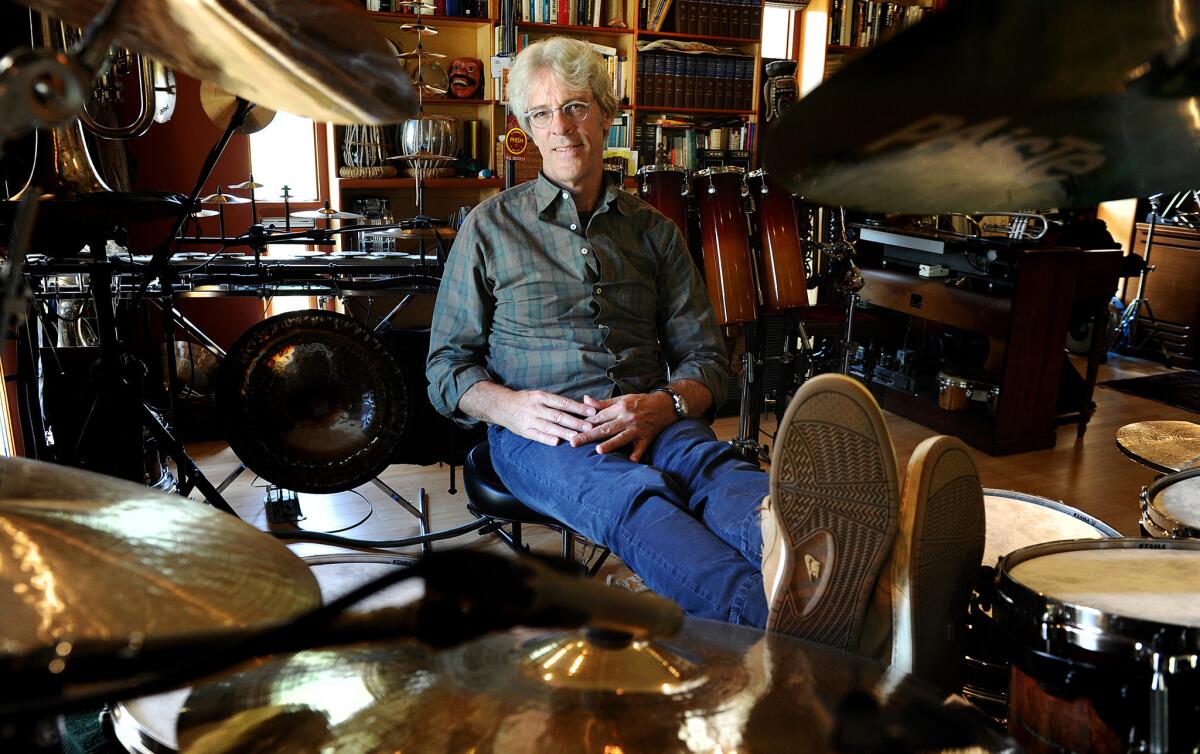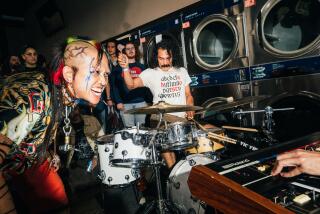WholeWorldBand app enables music artists, fans to collaborate via Web

Drummer and founding Police member Stewart Copeland is ready for a jam session in his Brentwood home studio, which he calls the Sacred Grove.
Music giants such as Ben Harper, Snoop Dogg and Primus have all dropped by to improvise with Copeland, who keeps his lair equipped with obscure musical instruments and assorted tribal headgear on the walls. And, most important, microphones and video cameras are set up around the studio to capture spontaneous music-making.
Now Copeland wants fans to jam with him — through the Internet.
The percussionist and composer recently sat down to record a simple drum track, something Tommy Ramone might have cranked out in a garage in the 1970s. He then turned it over to fans. Through an iPhone and iPad app called WholeWorldBand, amateur musicians piled on their own vocals and bass lines and wah-wah electric guitar solos to turn Copeland’s spare original into full-blown rock songs.
The Web has made it possible for people who play music as a hobby to write and record music — even collaborate with a rock legend — and share the creations through sites such as YouTube. It’s far removed from the days when Copeland, Sting and Andy Summers were recording classics such as “Roxanne” and “Message In a Bottle.”
And that’s a good thing for creativity, Copeland said.
“The talent pool has widened,” Copeland said. “Back when I was a kid, you couldn’t make an album without being surrounded by professionals and studio equipment you can’t afford. You couldn’t do it yourself. You had to go to the man.”
To Christopher Sampson, founding director of the Popular Music program at USC’s Thornton School of Music, the app is part of a gradual elimination of the barrier between fans and professional artists.
For example, artists including Public Enemy and Moby have used BitTorrent technology to let people remix their tracks and share them. A couple of years ago, the popular songwriter Beck released a book of sheet music so that fans could record covers, which were put on the project’s website.
“The gatekeepers have fallen away,” Sampson said.
WholeWorldBand was created by Copeland’s longtime friend Kevin Godley, formerly of the English art rock band 10cc, who directed music videos for some of the Police’s biggest hits. The Irish company in May raised 5 million euros, or about $6.85 million, in venture capital funding from European investors.
It’s far from the first company to let people record music through smartphones — Apple Inc.’s GarageBand, for instance, is a well-known example. But Godley’s idea was to get professional musicians and bedroom rockers to collaborate online through their smartphones and tablets. Such apps give artists new ways to reach their fans.
For instance, the Dutch symphonic metal band Within Temptation used the service to promote its single “And We Run.” The band members recorded parts separately and put them on the app, allowing users to make their own mixes and contribute their own ideas. The band said the best contributions would be used in a future alternate version of the track.
“If you’re a fan of that band, that’s a really compelling thing,” said Rodney Orpheus, WholeWorldBand’s vice president of business development outside North America.
But the creators of WholeWorldBand don’t want the app to be a mere promotional tool, executives said. They also hope to make money.
The process starts when an artist uploads the “seed session,” or the bare bones of the song for others to work with. Then others can pay $1 to $7 to record their own contributions, like melodic vocals and lyrics, rap verses or a harpsichord. That money gets divided among Apple’s iTunes, WholeWorldBand, the original artist and other rights holders.
If the resulting video gets put on YouTube and starts making money from advertising, the original artists and collaborators share that revenue.
WholeWorldBand is one of many ways companies and musicians are trying to benefit from the explosion of Internet music videos made not by the chart-toppers themselves, but by enthusiasts.
“People are hungry for new revenue,” said Paul Anthony Troiano, chief executive of Rumblefish Inc., a digital music licensing company in Portland, Ore.
Popular songs, like “Let It Go” from the Disney blockbuster “Frozen” or Sam Smith’s “Stay With Me,” have been covered over and over by fans wanting to show off their own chops. This year, YouTube users have uploaded more than 200,000 hours worth of songs with “cover” in the title, up about 26% from the same period last year.
This has resulted in new ways for artists to make money as people purchase fewer albums. In the first six months of 2014, U.S. album sales fell nearly 15% from a year earlier, according to Nielsen SoundScan. Meanwhile, Americans streamed on-demand music videos 36.6 billion times, up about 35% from 2013.
Music licensing is complicated, so much so that it took Godley’s team two years to figure out how to ensure people got paid for their work.
“If they’ve gotten that done, that’s awesome,” said Brent McCrossen, CEO of the New Orleans music licensing technology company Audiosocket. “It certainly wouldn’t have been easy.”
Although the rates paid by YouTube are low, revenue from fan videos using music has surpassed the money made from official videos on the site, according to a report this year by the recording industry organization IFPI. Music licensing for Internet videos has produced a cottage industry of companies that help artists make money from works that use their music. Examples include Rumblefish, AdRev and Audiam Inc.
It’s also a significant business for YouTube, which finds videos that use copyrighted music through a technology called Content ID and places ads on them. The Google-owned company says a third of its revenue comes from that system.
But Copeland, who now composes orchestral music, is far less interested in licensing technology and WholeWorldBand’s business model than simply creating music for other people to participate with.
“People can take those humble drums, get engaged with them and receive art to interact with,” he said. “That’s a good feeling.”
More to Read
From the Oscars to the Emmys.
Get the Envelope newsletter for exclusive awards season coverage, behind-the-scenes stories from the Envelope podcast and columnist Glenn Whipp’s must-read analysis.
You may occasionally receive promotional content from the Los Angeles Times.







